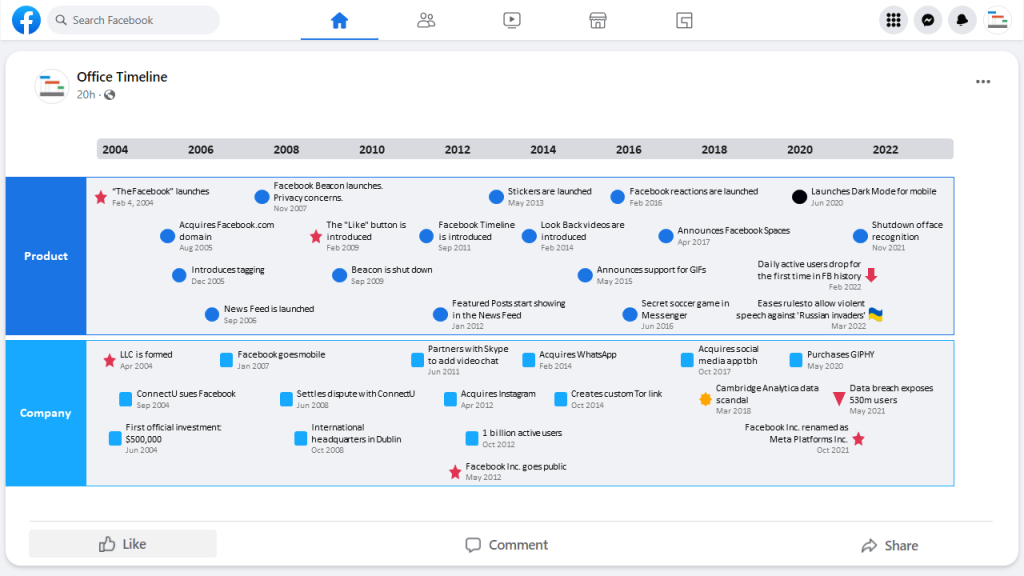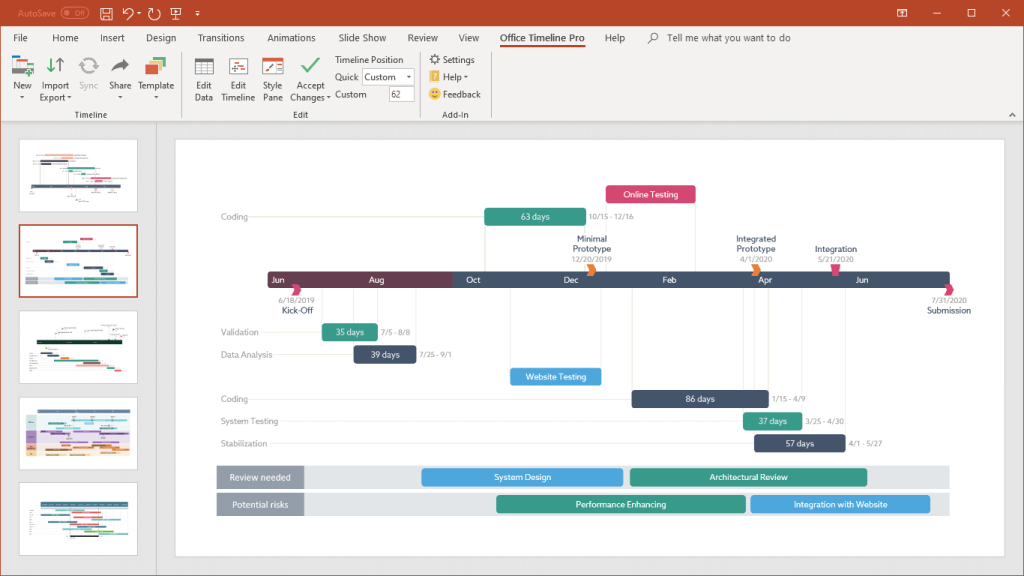Updated on July 29, 2022
On February 4, 2004, Mark Zuckerberg launched a social website called “TheFacebook” (currently known as “Facebook“) from his dorm room at Harvard. Soon, what started as a private network for college students became a worldwide phenomenon, everyone from teens to grandmothers using it to catch up with friends and get their news. For those interested in the history of Facebook rather than the news on Facebook, here’s a timeline of the milestones that helped shape the social media giant we know today.
The Facebook history timeline illustrates important events, achievements, and releases in the narrative of the social networking platform, from the day the service was launched to present day. Below the timeline, you will also find a series of frequently asked questions regarding the company and its evolution throughout the years.

The history of Facebook: a timeline
- 2004, February 4: “TheFacebook” launches
- 2004, April 13: LLC is formed
- 2004, June: First official investment
- 2004, September: ConnectU sues Facebook
- 2005, August: The company acquires the facebook.com domain and drops the “The” in its name
- 2005, December: Introduces tagging
- 2006: News Feed is launched
- 2007, January: Facebook goes mobile
- 2007, May: Launches Facebook Platform for developers
- 2007, November: Launches Facebook Beacon, a targeted ad system that published the users’ activities on external sites without permission, creating significant privacy concerns and resulting in a class-action lawsuit.
- 2008, June: Settles dispute with ConnectU
- 2008, October: International headquarters in Dublin
- 2009, February: The “Like” button is introduced
- 2009, November: Beacon is shut down
- 2011, June: Facebook partners with Skype to add video chat
- 2011, November: Facebook Timeline is introduced
- 2012, January: Featured Posts start showing in the News Feed
- 2012, April: Facebook acquires Instagram
- 2012, May: Facebook goes public
- 2012, October: The social media platform reaches 1 billion active users, an important milestone in Facebook’s history timeline
- 2013, May: Stickers are launched
- 2013, August: Launches Internet.org
- 2014, February: Acquires WhatsApp
- 2014, February: Look Back videos are introduced
- 2014, October: Creates custom Tor link
- 2015, March: Peer-to-peer payments in Messenger
- 2015, May: Announces support for GIFs
- 2016, February: Facebook reactions are launched
- 2016, June: Secret soccer game in Messenger
- 2017, April: Announces Facebook Spaces
- 2017, October: Acquires social media app tbh
- 2018, March: The Cambridge Analytica data scandal starts, probably the biggest in the history of Facebook
- 2020, May: Purchases GIPHY
- 2020, June: Launches Dark Mode for mobile
- 2021, May: Data breach exposes 530m users
- 2021, October: Facebook Inc. renamed as Meta Platforms Inc.
- 2021, November: Shutdown of face recognition
- 2022, February: Daily active users drop for the first time
- 2022, March: Eases rules to allow violent speech against ‘Russian invaders’
Frequently asked questions about Facebook and its evolution
Still thirsty for knowledge after reading the Facebook history timeline? Then let’s go with flow and discover the answers to the most common questions about the social media giant.
Officially, Facebook was launched on February 4, 2004, by Mark Zuckerberg and fellow Harvard students Eduardo Saverin, Dustin Moskovitz, Andrew McCollum, and Chris Hughes. Back then, the site was intended as a social media platform for Harvard students exclusively. However, the story of how it started is a little more complicated than that and has sparked quite a bit of controversy.
It all started in 2003, when Zuckerberg created FaceMash, a platform that allowed users to compare photos of colleagues and decide who was “hotter”. FaceMash was problematic and short-lived, yet surprisingly popular, leading Zuckerberg to see the potential of a campus-wide social network. And so, the next year, he launched the “TheFacebook”, which became an instant hit.
TheProblem? Well, just a week after the launch, Zuckerberg was accused by three Harvard seniors that the idea was stolen from them. This resulted in a lawsuit, which settled in 2008 with the each of the accusers getting 1.2 million shares in the company.
Mark Zuckerberg created Facebook to help Harvard students connect with one another. Back then, there weren’t any universal online face books at the university. Sororities and fraternities each had their own individual directories, and there were paper sheets with student and staff profiles distributed to freshmen, but there was no centralized platform. This is what Zuckerberg tried to do with Facebook: gather all that information in one place so that all students at Harvard can learn about each other and communicate with one another.
Facebook was an instant hit. Within the first month after its official launch in February 2004, over half of Harvard’s undergrad students were already registered on the platform. In March that year, the site expanded to Yale, Columbia and Stanford too, and it was gradually adopted by most universities in the US and Canada. In 2005, Facebook opened to high school students too, and in 2006 it was made available to the general public.
By the end of 2005, the platform already had 6 million users, and it continued to grow exponentially over the years. As you can see on the Facebook history timeline, the site reached a whopping 1 billion active users in October 2012.
When launched officially in 2004, the social networking site was originally called “TheFacebook”. The company gave up the “The” from its name after purchasing the facebook.com domain in August 2005, for which it paid $200,000. Now, if you consider FaceMash to be a first version of Facebook (we’re talking about the “Hot or Not” social site that inspired Zuckerberg to build Facebook), you could say “FaceMash” was the original name of the renowned platform.
Facebook, Inc. (now Meta Platforms, Inc.) IPOed in 2012, so it is publicly owned. However, co-founder and chairman Mark Zuckerberg is the largest shareholder, owning 29.3% of the company, as well as the only CEO throughout the history of Facebook. Therefore, Zuckerberg is largely seen as the owner of the enterprise.
Unsurprisingly, Facebook’s first user was the founder himself, Mark Zuckerberg. He had the first official account ever created on Facebook, with ID #4. Accounts #1 to #3 were tests made by Zuckerberg, which he deleted afterwards. Next after him were co-founders Chris Hughes and Dustin Moskovitz. The first non-founder Facebook user was Arie Hasit, a friend of the founders who wasn’t involved in the project as he wasn’t interested in computer science.
Well, it depends who you ask. If you ask Zuckerberg, the answer will be no. But Facebook has had its fair share of scandals and controversies throughout its history, and one of the first is the accusation that Mark Zuckerberg stole the idea for Facebook from ConnectU (originally called HarvardConnection.com), which involved three Harvard seniors who were building a – wait for it – social network for Harvard.
The three students – Divya Narendra and brothers Tyler & Cameron Winklevoss – accused Zuckerberg of pretending to help them build the social network they envisioned, but instead stealing their idea to create Facebook. After a 4-year-long legal battle, Facebook ended up paying each of the three accusers 1.2 million in shares. Since the lawsuit ended in a settlement that involved paying quite a big amount to the accusers, one might draw the conclusion that there may be some legitimacy to the claims.
As you can see on the Facebook history timeline, Facebook (the company, not the app) changed its name to Meta Platforms in October 2021. But why the rename? Well, quite a lot of voices said it happened in an attempt to shake off the scandals the company has had been involved in the last years, including spreading misinformation, data leaks, and others. However, CEO Mark Zuckerberg stated that Facebook changed its name primarily because the “Meta” name was more closely aligned with what the company was working toward, namely the “metaverse”, an online virtual space that would unify multiple disparate digital worlds.
As of July 2022, Mark Zuckerberg’s net worth is $63 billion according to Bloomberg’s Billionaires Index. The Facebook founder has lost over 50% of his wealth in 2022. Still, he remains one of the richest people in the world, currently ranking 17th.
It’s estimated that Facebook (Meta Platforms) owns over 90 companies, many of which are hidden to the public, so it would be quite difficult to list them all. However, here are a few of the top companies owned by the social media giant:
· Instagram
· Giphy
· WhatsApp
· Oculus VR
· Onavo
· Tbh
· ConnectU – Yes, you read that right. This is the exact same company that’s known in the history of Facebook as the one that accused Zuckerberg of stealing the idea for the social networking platform. As a result of the lawsuit settled in 2008, besides other payments Facebook made towards the accusers, it also bought ConnectU as part of the settlement.
· Atlas Solutions
· LiveRail
· RedKix
· CTRL-Labs
· Beluga
· Spool
· FriendFeed
Yes, Facebook does own Instagram, widely abbreviated online as IG. The Facebook history timeline shows that the company acquired IG in 2012. They paid $1 billion for IG, a shocking sum at the time. According to email exchanges between Zuckerberg and former CFO David Ebersman made public by the US House antitrust committee, the company wanted to purchase Instagram to avoid competition. They saw IG as a potential threat to the social network, which could take business away from Facebook. Other sources say that the real reason Facebook became the owner of Instagram was to fend off competition from Google+ and Twitter.
No, Facebook does no own TikTok. The popular video hosting service is owned by ByteDance, a Chinese multinational IT corporation headquartered in Beijing. Interestingly enough, while it does not own the video sharing app, Facebook has an account on TikTok. The account seems to have been set up in March, 2022, and it is verified and confirmed to be legitimate.
No, never in the history of Facebook has the social networking platform been owned by Google. Facebook is a publicly owned company, with its largest three shareholders being Mark Zuckerberg, Jim Breyer & Accel Partners, and co-founder Dustin Moskovitz.
Facebook keeps repeating in its privacy policies and public statements that it does not sell your data to third parties. And if we were to take that literally, it’s absolutely true. The company indeed doesn’t sell your data – not directly. What it sells instead is targeted advertising, allowing third parties to use the data Facebook has on you to show you personalized ads.
About the Facebook history timeline
Our timeline of Facebook’s history was created in PowerPoint using Office Timeline, a fast and intuitive tool designed to help users create eye-catching Gantt charts, timelines and roadmaps effortlessly. The visual is free to modify and share and can be edited or customized further either straight in PowerPoint, or using the Pro+ Edition of the timeline maker, which automates the whole process.
Download the Facebook history timeline for PowerPoint and get your free trial of Office Timeline to update it effortlessly or create your own beautiful visuals in minutes.

Turn project data into professional timelines
Get the advanced features of Office Timeline Pro+ free for 14 days.
Get free trial